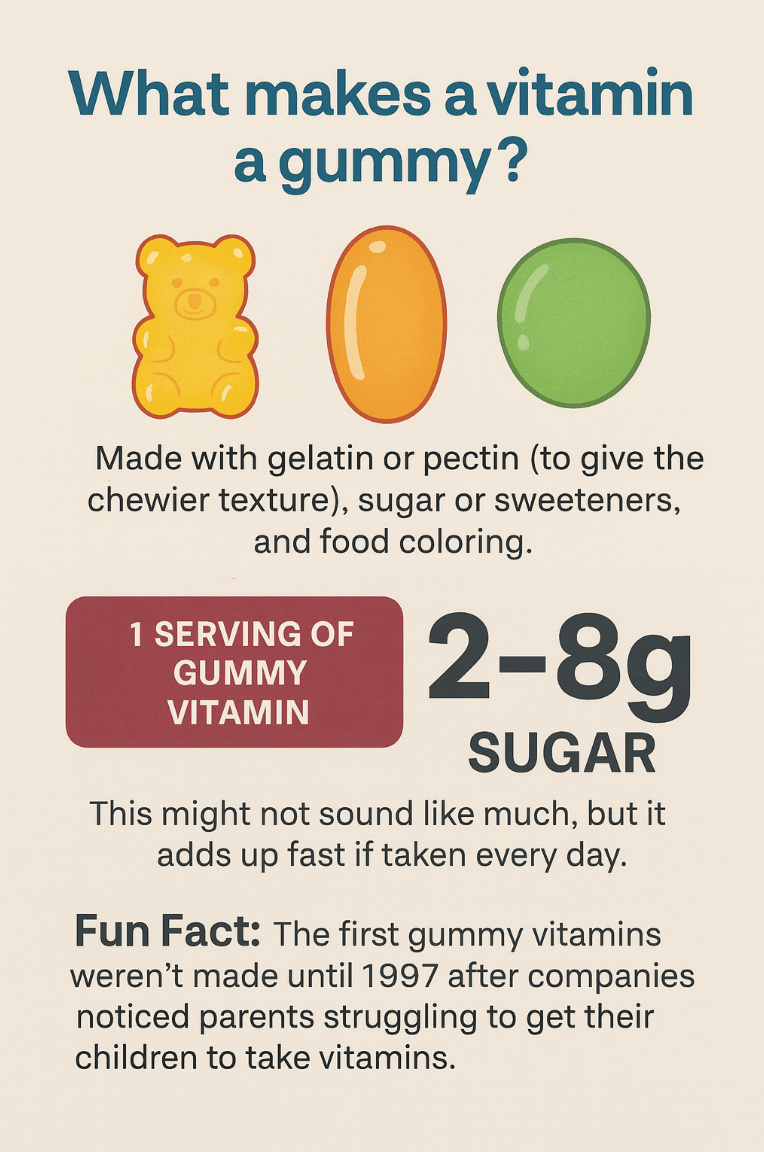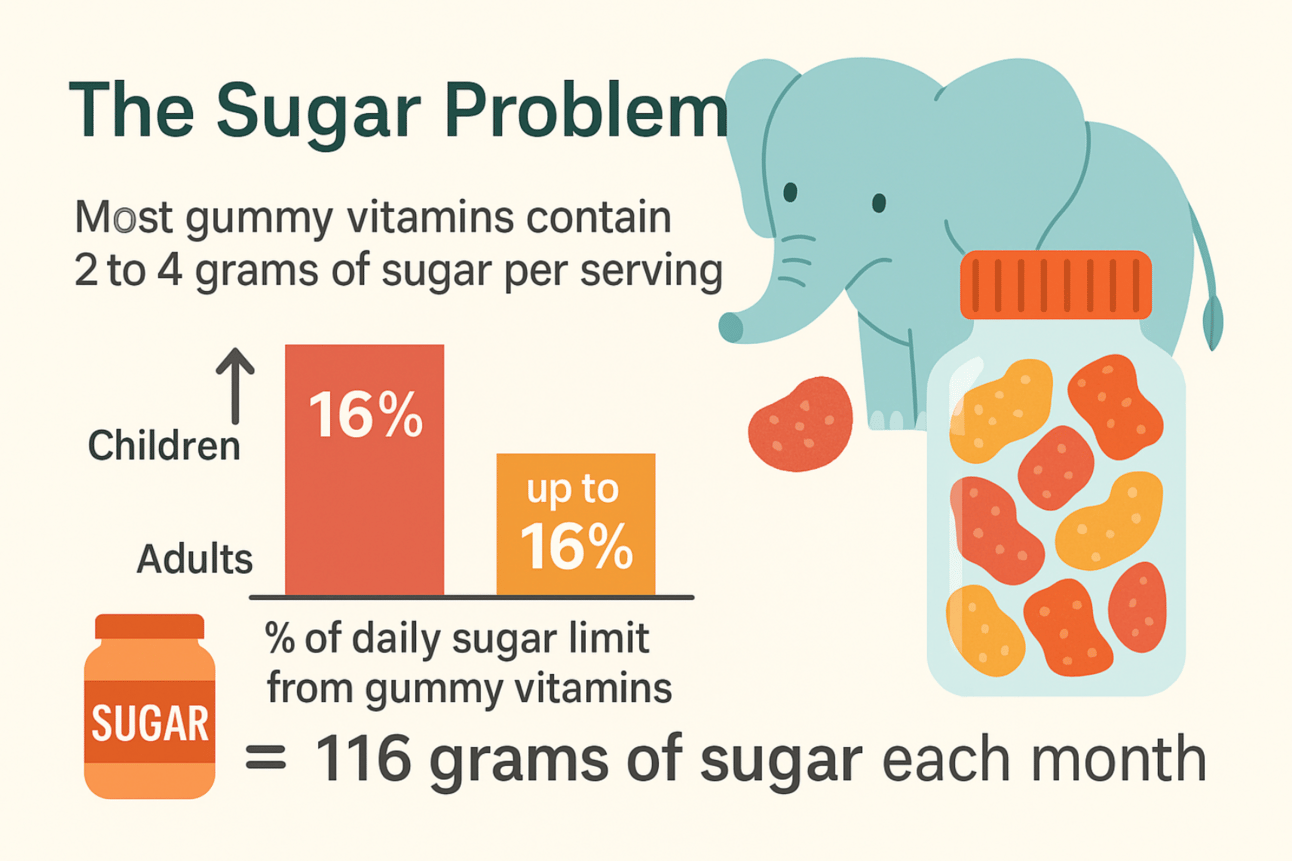- Aeviva
- Posts
- The Hidden Truth About Gummy Vitamins: What Companies Don't Want You To Know
The Hidden Truth About Gummy Vitamins: What Companies Don't Want You To Know
Discover why these colorful supplements might not be giving you what you need.

The vitamin aisle has changed a lot in recent years. Gone are the days when vitamins only came as pills or tablets. Now we see colorful gummy vitamins everywhere. From kids to adults everyone seems to be choosing these sweet options over traditional pills. Sales of gummy vitamins have gone up by over 25% in the last three years alone. People love them because they taste good and are easy to take.
But are these candy like supplements really good for us? Do they work as well as regular vitamins? Let's look at what science says about these popular treats and if they deserve a place in your daily routine. 🔬 💊 🍬
Looking for unbiased, fact-based news? Join 1440 today.
Join over 4 million Americans who start their day with 1440 – your daily digest for unbiased, fact-centric news. From politics to sports, we cover it all by analyzing over 100 sources. Our concise, 5-minute read lands in your inbox each morning at no cost. Experience news without the noise; let 1440 help you make up your own mind. Sign up now and invite your friends and family to be part of the informed.
What Makes a Vitamin a Gummy?
Gummy vitamins are made differently than regular pill vitamins. They contain gelatin or pectin that gives them their chewy texture. Companies add sugar sweeteners and food coloring to make them taste and look better. A typical gummy vitamin contains about 2 to 8 grams of sugar per serving. That might not sound like much but it adds up quickly if you take them every day. 🧪
Research from the Journal of the American Medical Association found that many gummy vitamins contain only 30% to 75% of the vitamins listed on their labels. This happens because vitamins can break down during the manufacturing process or while sitting on store shelves. Regular tablet vitamins usually have extra amounts added to make sure they stay potent until their expiration date.

The Sugar Problem
Let's talk about the elephant in the room sugar. Most gummy vitamins contain between 2 to 4 grams of sugar per serving. That might not seem like much but the American Heart Association recommends children have no more than 25 grams of added sugar per day and adults no more than 36 grams for men and 25 grams for women. Taking gummy vitamins daily means you're using up to 16% of your daily sugar allowance just on supplements. 🍭
A study published in the Journal of Pediatrics found that many children who take gummy vitamins daily consume an extra 116 grams of sugar each month just from their supplements. That's like eating an extra 29 teaspoons of sugar every month.

Fun Fact: Some gummy vitamins contain as much sugar per piece as regular gummy candy.
Limited Nutrient Content
Because of space limitations in the gummy format many manufacturers can't fit all the nutrients you need into a single gummy. Traditional multivitamin tablets might contain 20 to 30 different nutrients while gummy versions often have only 9 to 12. 📊
This table shows what's often missing from gummy versions:
Nutrient | Usually in Pills | Often Missing in Gummies |
|---|---|---|
Iron | Yes | No |
Calcium | Yes | Limited amounts |
Magnesium | Yes | Limited or absent |
Full B complex | Yes | Only selected B vitamins |
Vitamin K | Yes | Often absent |
Stability and Degradation
Unlike pills gummy vitamins are more vulnerable to heat moisture and time. Studies show that vitamin C in gummy formulations can degrade by up to 24% within six months of manufacturing even when stored properly. 📉
Researchers at ConsumerLab found that 80% of tested gummy vitamin products contained significantly different amounts of nutrients than their labels claimed. Some had much less while others had much more showing how hard it is to control dosing in this format.
Fun Fact: Gummy vitamins need to be stored in cool dry places away from sunlight to prevent faster nutrient degradation.
How To Decide If Gummy Vitamins Are Right For You
Answer these questions to see if gummy vitamins make sense for your needs:
Do you have trouble swallowing pills?
Yes: Gummies might help you take vitamins regularly
No: Traditional vitamins might give you more nutrients for your money
Do you carefully watch your sugar intake?
Yes: Look for sugar free options or stick with traditional vitamins
No: Regular gummies might be fine but be aware of the added sugar
Do you need specific nutrients like iron or full mineral content?
Yes: Check labels carefully most gummies lack these
No: Basic gummy vitamins might meet your needs
Gummy vitamins have their place in the supplement world. They make taking vitamins more enjoyable which means people are more likely to remember to take them. This is their biggest advantage. However they come with real tradeoffs including added sugar fewer nutrients and less stability over time. The best vitamin is the one you actually take but it's worth considering if a traditional pill might give you better nutritional value.
For children who refuse pills or adults with swallowing difficulties gummies can be a good compromise. Just be aware of what you're trading off in nutritional content. Always check labels to know what you're actually getting and store your gummies properly to maintain their potency. Remember that vitamins whether gummy or pill should supplement a healthy diet not replace it. 🥗 💪
Take-Home Summary
Gummy vitamins often contain 2 4 grams of sugar per serving which adds up over time
Most gummy formulations contain fewer vitamins and minerals than traditional pills
Nutrients in gummy vitamins degrade faster so potency may decrease over time
Gummies rarely contain iron and often have limited amounts of other essential minerals
The best choice depends on your personal needs swallowing ability and whether you'll consistently take your vitamins
Store gummy vitamins in cool dry places to maintain their effectiveness
Supplements should complement a healthy diet not replace nutritious foods


Reply